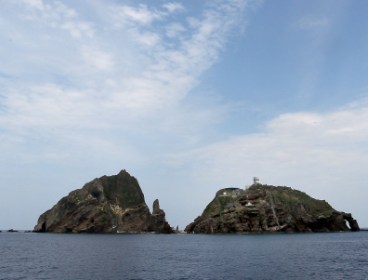S. Korea steps up effort for concurrent naming of East Sea/Sea of Japan
South Korea has lodged an official complaint with the U.S. after one of its agencies backed Japan’s name for the waters between the Korean Peninsula and Japan, and will maintain efforts for concurrent naming to resolve international misunderstanding, the Foreign Ministry here said Monday.
The appellation for the body of waters, called the “East Sea” by Koreans and the “Sea of Japan” by the rest of the world, has long been a source of tension between the two neighboring countries who have often clashed over historical and territorial issues.
South Korea has lodged an official complaint with the U.S. after one of its agencies backed Japan’s name for the waters between the Korean Peninsula and Japan, and will maintain efforts for concurrent naming to resolve international misunderstanding, the Foreign Ministry here said Monday.
The appellation for the body of waters, called the “East Sea” by Koreans and the “Sea of Japan” by the rest of the world, has long been a source of tension between the two neighboring countries who have often clashed over historical and territorial issues.

The naming of the waters is a sensitive issue for Korea, as it continues to battle Tokyo’s attempt to lay territorial claims over the Korean islets of Dokdo that lie in rich fishing grounds in the East Sea.
Reports about the U.S. government-funded agency’s decision to back Japan’s name for the waters came only days after Seoul and Tokyo locked horns over Japan’s renewed claims to the rocky islets. Public anger against Japan, which colonized Korea 1910-45, exploded when three right-wing Japanese lawmakers unsuccessfully attempted to visit the South Korean islands despite an entry ban.
The U.S. maritime boundary agency recently notified the International Hydrographic Organization that it backed the use of “Sea of Japan.” The agency’s move was soon echoed by Britain, according to diplomatic sources here.
“We have delivered an official complaint to the U.S. government via a diplomatic channel over its agency’s decision to unilaterally support Japan,” an unnamed diplomatic source in Seoul said.
“We expressed our position that both names should be used concurrently to avoid unnecessary tension,” the source said.
Under international customs and consensus, waters under dispute must be subject to the simultaneous use of different names, another source here said.
Washington played down the agency’s decision, saying it did not represent the government’s official position on the issue.
Facing difficulty in having “East Sea” as the only international appellation, the South Korean government has been pushing since April to have the international organization use two official names for the waters.
Since 2009, expert groups belonging to the 27 member nations of the IHO have been discussing ways of unifying the official appellation of the waters. Only a number of countries, such as the U.S. and Britain, have delivered their position to the IHO so far, a Seoul Foreign Ministry official said.
“As discussions are continuing among the IHO expert groups on this issue, it would be inappropriate for us to reveal details of their position,” the official said on the condition of customary anonymity.
“All we can say for now is that the U.S. has a single name policy and it has, until now, used the title the ‘Japan Sea,’” he said.
Members of the international body, which has previously designated hydrographic names throughout the world in 1929, 1937 and 1953, are scheduled to meet next year to update the hydrographic information and data in their publication. The group has, until now, used the title “Sea of Japan.”
Arguing the misunderstanding was triggered by Japan’s coercive demand during its colonial rule to use the Japanese language for the designation of Korea’s mountains, seas and even names of individuals, Seoul has been striving to promote the East Sea as the official title for decades.
While only 2.8 percent of the world maps used concurrent titles for the East Sea in 2000, more than 28 percent of the maps are currently using both titles, the Seoul official said.
“We are continuing efforts and closely consulting the matter with the IHO,” he said.
Scholars here have provided evidence that even Japan used the name “Sea of Joseon,” referring to the name of an ancient Korean dynasty, in historical documents.
By Shin Hae-in (hayney@heraldcorp.com)







![[Graphic News] More Koreans say they plan long-distance trips this year](http://res.heraldm.com/phpwas/restmb_idxmake.php?idx=644&simg=/content/image/2024/04/17/20240417050828_0.gif&u=)
![[KH Explains] Hyundai's full hybrid edge to pay off amid slow transition to pure EVs](http://res.heraldm.com/phpwas/restmb_idxmake.php?idx=644&simg=/content/image/2024/04/18/20240418050645_0.jpg&u=20240419100350)





![[From the Scene] Monks, Buddhists hail return of remains of Buddhas](http://res.heraldm.com/phpwas/restmb_idxmake.php?idx=652&simg=/content/image/2024/04/19/20240419050617_0.jpg&u=20240419175937)

![[KH Explains] Hyundai's full hybrid edge to pay off amid slow transition to pure EVs](http://res.heraldm.com/phpwas/restmb_idxmake.php?idx=652&simg=/content/image/2024/04/18/20240418050645_0.jpg&u=20240419100350)

![[Today’s K-pop] Illit drops debut single remix](http://res.heraldm.com/phpwas/restmb_idxmake.php?idx=642&simg=/content/image/2024/04/19/20240419050612_0.jpg&u=)